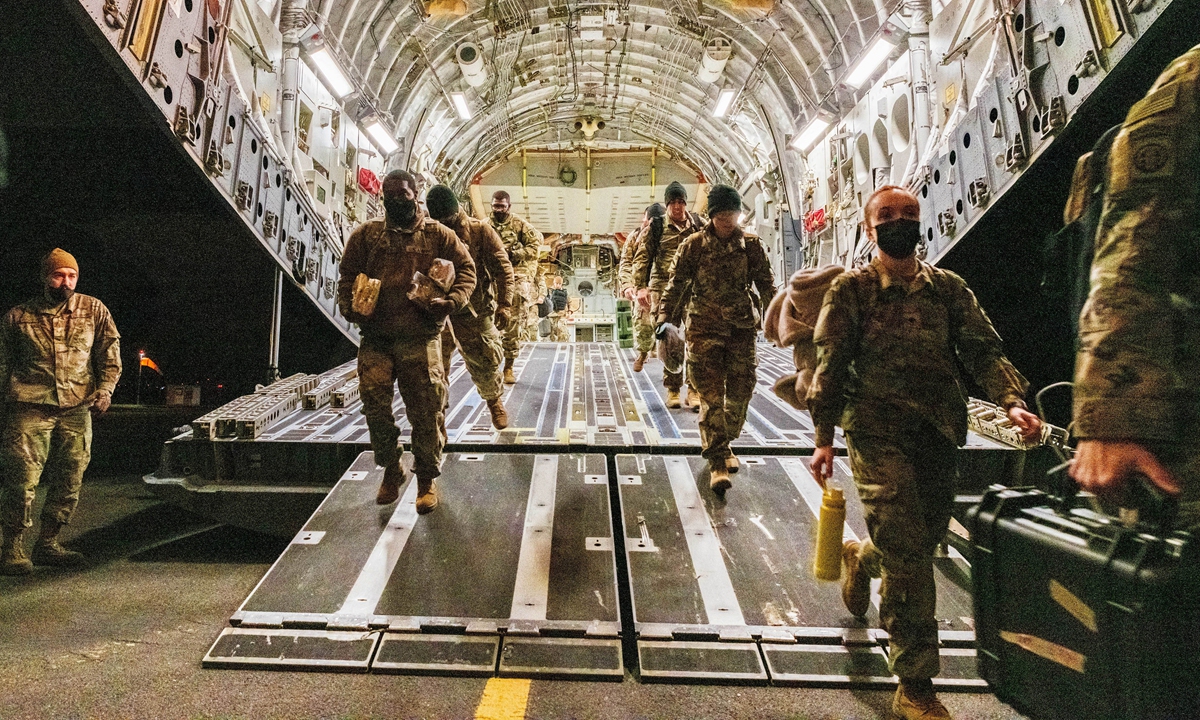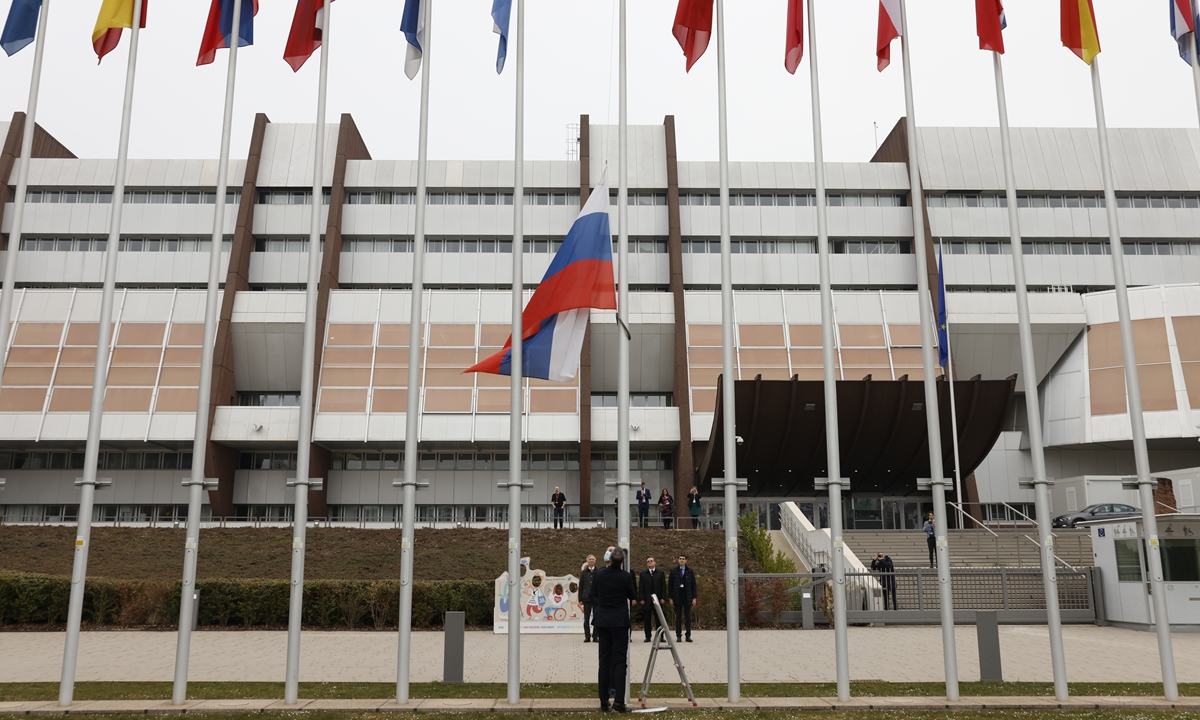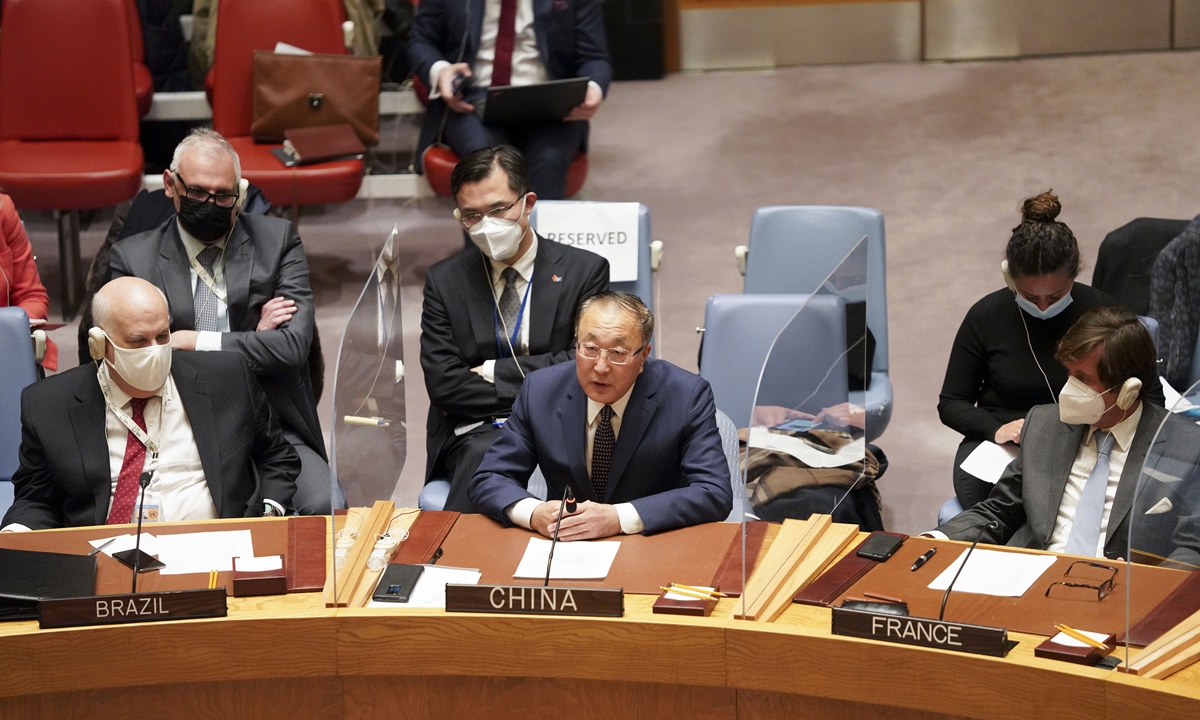Russia-Ukraine conflict can be regarded as a 'preview' of US' possible acts in Asia: Zheng Yongnian
NATO's phantom

A troop of additional US soldiers deployed to Europe in response to tensions between Russia and Ukraine arrives at Wiesbaden, Germany on February 4, 2022. Photo: IC
Editor's Note:"We can regard the Russia-Ukraine conflict as a "preview" of the US' possible acts in Asia… NATO's expansion will not stop unless there is another bloc that forms as a check and balance," said Zheng Yongnian (Zheng) in an exclusive interview with Global Times (GT) reporters Li Aixin and Bai Yunyi. The conflict continues, as peace talks are inching ahead amid stumbling blocks. Will it turn into a Pandora's box for the global geopolitical landscape? What lessons can China learn? Zheng shared his views about these issues. Zheng is the presidential chair professor, acting dean of the School of Humanities and Social Science, and the Founding Director of the Advanced Institute of Global and Contemporary China Studies at the Chinese University of Hong Kong, Shenzhen.

Zheng Yongnian Photo: Courtesy of Zheng
GT: What do you predict for the future development of the Russia-Ukraine conflict? Will a compromise be reached or will it trigger a larger-scale war?Zheng: So far, although NATO has been reluctant to directly confront Russian forces, it is still hard to say that this conflict is just between Russia and Ukraine. Due to complicated factors, neither side has shown any sign of stopping their moves. There are even signs of escalation when all other parties are calling for a truce.
From a realistic perspective, Putin's goal may not be taking the entire Ukraine. Putin should have realized that conquering Ukraine, a country larger than Germany in size, is not an easy task. Besides, Zelensky is not a fantasist. By now he should have understood that Ukraine cannot win the war without the direct involvement of NATO. Europe has been taking the US side to impose economic sanctions on Russia, yet countries such as Germany and France are paying more for something less.
All the factors mentioned above are the potential impetus for various parties to reach a compromise. The problem is how to bring the impetus into full play. If conventional warfare goes out of control, the use of small nuclear weapons is not completely impossible, and once this scenario occurs, the war will spill over to the whole of Europe.
GT: Since the conflict broke out, Germany has increased its defense spending, Finland's public opinion on NATO membership went through a major change, and Georgia applied to join the EU… How do you think the Russia-Ukraine conflict will change Europe's geopolitical map? And what impact will it have on the world?
Zheng: Although Europe is now standing with the US, such "solidarity" is very fragile. From a long-term and historical perspective, Europe is at risk, and the EU is at a particularly vulnerable moment.
First, Germany announced in February that they will increase the country's spending on defense to more than 2 percent of its GDP, which may signal that military competition will again take place in Europe. In the short term, European countries have not yet opposed Germany's move amid the Russia-Ukraine conflict. Yet in the long run, what does a remilitarized Germany mean for France? That is the last thing France would like to see. Geopolitics within Europe may witness major changes.
Second, Europe may also face the risk of nuclear proliferation. Belarus has approved constitutional reforms to ditch the country's non-nuclear status, which might cause a domino effect. If the extreme scenario - Russia collapses - occurs, resulting in nuclear arms proliferation, Europe may eventually face a major nuclear threat.
After the Cold War, many American intellectuals, such as Samuel P. Huntington, believed that Europe and the US had almost integrated into one, and conflicts could only occur between different civilizations. I think the view is wrong. Be it World War I or World War II, the wars broke out within the same civilization in Europe. The Cold War, between the US and Russia, also took place between one large civilizational circle. Fierce conflicts happen again within Western civilization isn't necessarily an impossibility.
Third, Germany's "remilitarization" may also encourage Japan to again push for a constitutional revision to seek "remilitarization," changing the geopolitical landscape of Asia. Japanese Prime Minister Fumio Kishida has already voiced to push to revise the country's pacifist Constitution. This will impact on the entire East Asia.
From a long-term geopolitical and economic perspective, there is no winner in this war, except for the US. A strongly united Europe wouldn't need the US anymore, but it is precisely because Europe has its divergences that the US can better consolidate its leadership in NATO.

Staffers lower the Russian national flag outside the building of Council of Europe in Strasbourg, France on March 16, 2022.Photo: VCG
No matter how the Russia-Ukraine conflict ends, Europe needs a major geopolitical reflection: Should European affairs be dominated by the US in the future? Is Europe really able to independently handle Russia-related affairs? Neither we nor Europe itself should ignore Europe's power.GT: In a recent article, you mentioned that the Russia-Ukraine conflict could fundamentally influence the international order. Can we still view future global order under the logic of China-Russia-US triangular relations?
Zheng: Since the end of the Cold War, the US has increasingly made light of Russia, believing that Russia is merely a "troublemaker," while China is the main competitor or even an enemy.
Therefore, over the past few years, what the US has been doing is trying to build an "Asian NATO" against China. From George W. Bush's "neoconservatism," to Barack Obama administration's "Pivot to Asia," and then to the Indo-Pacific Strategy under Donald Trump and Joe Biden administrations, the US' strategic focus has increasingly shifted from Europe and the Middle East to the Asian-Pacific region.
In my opinion, the outbreak of the Russia-Ukraine conflict will not change the US' overall strategic direction. However, this conflict fully reflects US elites' underestimation of Russia.
In general, the post-WWII order is in the process of quick disintegration. Many countries are seeking their own geopolitical sphere of influence and hope to establish an international order that is beneficial to themselves. Russia is only one of them. In this regard, Germany, France, Turkey and India also have their goals. Therefore, it is no longer enough to view today's world from the perspective of the "China-Russia-US Triangle."
GT: How do you view NATO's future? Has NATO's expansion reached its limit?
Zheng: NATO's expansion will not stop. Different from economic organizations, the military bloc is characterized by infinite expansion. We can regard NATO as a military empire dominated by the US, and if we look at NATO we can understand the old English proverb - "absolute power corrupts absolutely" - NATO is in fact already the most typical case of "absolute power" and "absolute corruption" in international politics.
Historically, NATO has gone through several expansions, each of which has caused huge changes in Europe. Even former Russian president Boris Yeltsin who was pro-West once said that "the eastward expansion of NATO is a mistake." When will NATO's expansion in Europe stop? Absolutely not now, and maybe it will not stop until there is another bloc that can compete with it and form a check and balance.
A more alarming trend is that the US-led military bloc NATO will not stop its expansion in Europe, but will likely expand to Asia. More precisely, what the US is doing in Asia now is nothing different from the formation of NATO back then. In fact, the prototype of an "Asian NATO" has already taken shape - AUKUS, Quad, Five Eyes, Indo-Pacific Strategy, as well as the US moves under Biden Administration to cozy up to Vietnam and Singapore… all these mechanisms are clearly aimed at China.
Asia's security is fragile. The reason why an "Asian NATO" has yet to be formally formed is entirely because China does not want to follow the example of the former Soviet Union to form its own bloc. After the Russia-Ukraine war broke out, the trend of Asia becoming the world economic center becomes more obvious, and US involvement in Asia will be further expanded. China and other Asian countries should sum up the lessons and deal with them in a serious manner - although there is no Ukraine in Asia, a Ukraine-style crisis could take place in many countries and regions in Asia.
GT: Some observers say that Putin's intention is to establish a "little Soviet Union" centered in Russia, Belarus and Ukraine, with Central Asian countries as a buffer zone. What's your take on the view?
Zheng: In its confrontation against the West, Russia can hardly be completely defeated. For a major power, failures are often temporary. Even without Putin, there would be a second Putin in the future - as long as Russia feels its national security is threatened. Therefore, as long as NATO exists, Putin, or Russia, has the intention to rebuild a "little Soviet Union." Although we do not wish for this scenario, Russia has its realistic motivation.
Like it or not, such a reality is rooted in Western history and culture. This is the logic of Western international politics. Since the era of Ancient Greece, there have been confrontations between two groups, and Russia is a part of Western civilization. Unless Russia is completely defeated this time - which is a very unlikely scenario - the polarization of Europe and the world will be inevitable. As mentioned above, the expansion of NATO will only stop when another bloc can compete with it and form a check and balance.
Once a new cold war takes shape between Russia and the US, it will be difficult for China to take sides, like India. That will be a huge disaster for the world.
GT: What do you think China can learn from the Russia-Ukraine conflict?
Zheng: For China, this war is a huge lesson. The biggest difference between China and the Soviet Union and Russia is that Russia is only a military power without strong economic strength, while China has both sufficient military strength to protect itself and close economic ties with the West. This explains why US elites believe China poses a far greater challenge to the US than Russia does. This explains why the US has been greatly uneasy about China's Military-Civil Fusion (MCF) development strategy over the years. The US is the most successful country in MCF in the world. Naturally, it does not want China to become such a country too.

Permanent Representative of China to the United Nations Zhang Jun (center) makes an address at an emergency meeting of the UN Security Council to tackle the situation in Ukraine on February 21, 2022. Photo: Xinhua
Economic openness and interdependence cannot prevent a war, but they can slow it down. We can regard the Russia-Ukraine conflict as a "preview" of the US' possible acts in Asia: Once fierce conflicts happen between China and the US, will the US kick China out of the SWIFT system as it did with Russia? My opinion is: 100 percent YES.However, if the US and Europe's economic sanctions on Russia backfire by 50 percent, the figure will come to 100 percent if they sanction China, a country with an open and strong economy. In this way, such sanctions will be difficult to sustain. At that time, China will not need to use the threat of nuclear weapons to defend its own interests like Russia, as China's economy, deeply embedded in the West, will already make the West feel real pain.
Therefore, China must stride toward greater opening-up, and Chinese enterprises must overcome all difficulties and keep going global.
Second, I do not think China should regard this Russia-Ukraine conflict as a war far away from itself. China is already a major power, and directly facing the war is part of the nation's fulfillment of its international responsibilities. We can neither allow the West narrative to define China-Russia ties at their will, nor can we allow the US to kidnap Europe. China and Europe have huge common interests without geopolitical disputes, and the two sides' ideological differences can be resolved.
Third, this conflict makes us ponder how China should deal with the balance between openness and security. In my opinion, security will always be a relative concept, yet not remaining open is the greatest insecurity. What we should do is to explore our own security mechanism while opening up, rather than stop opening up for the sake of so-called absolute security.
A biggest hidden danger that China faces is still the stagnation of development and the interruption in modernization. If we open the window, mosquitoes and flies will come inside. But as long as we are strong enough, a few bites by the bugs are not fatal.
